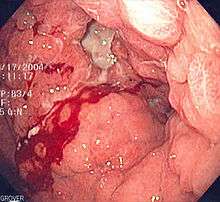Linitis plastica
| Linitis plastica | |
|---|---|
 | |
| Endoscopic image of linitis plastica, where the entire stomach is invaded with stomach cancer, leading to a leather bottle like appearance. | |
| Classification and external resources | |
| Specialty | oncology |
| ICD-10 | C16.9 |
| ICD-9-CM | 151.9 |
| ICD-O | M8142/3 |
| MeSH | D008039 |
Linitis plastica, also known as Brinton's disease or leather bottle stomach, is a morphological variant of diffuse (or infiltrating) stomach cancer.
Causes of linitis plastica could be lye ingestion or metastatic infiltration of the stomach, particularly breast and lung carcinoma.[1] It is not associated with H. pylori infection or chronic gastritis. The risk factors are undefined, except for rare inherited mutations in E-cadherin, which are found in about 50% of diffuse-type gastric carcinomas.[1]
This cancer (and most other stomach cancers) is more common in Asian countries, particularly Japan.
Presentation
Diffuse stomach cancer is characterized by the presence of poorly differentiated tumor cells. Microscopic appearance is signet ring cell carcinoma, which is tumor cells with mucin droplet that displaces the nucleus to one side.
The appearance of the stomach is like a "leather bottle".[2] It is characterized by a thick, rigid stomach wall caused by diffuse infiltration of tumor cells and extensive fibrosis.
Diarrhea may be a presenting symptom.
Notable cases
Napoleon Bonaparte and many members of his family are thought to have died from this type of cancer, although it is believed by others that he may have died from arsenic poisoning.[3]
References
- 1 2 Robbins Basic Pathology, 8th Edition
- ↑ "linitis plastica" at Dorland's Medical Dictionary
- ↑ Bevan S, Houlston RS (1999). "Genetic predisposition to gastric cancer". QJM : monthly journal of the Association of Physicians. 92 (1): 5–10. doi:10.1093/qjmed/92.1.5. PMID 10209666.
External links
| Wikimedia Commons has media related to Linitis plastica. |
- "Carcinoma of the Stomach." at patient.info
- 67502105 at GPnotebook
